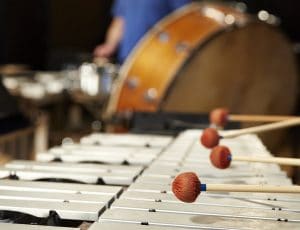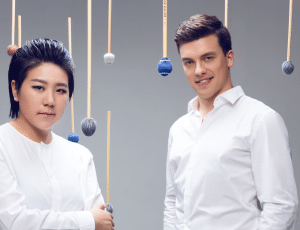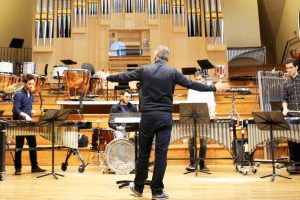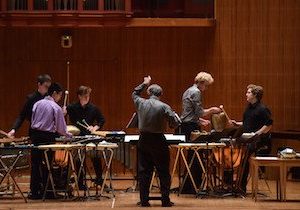Drum of the Deathless (Duo)
Ritual for Two Percussionists
YEAR: 2017
ORCHESTRATION: Percussion Duo
DURATION: 16'
DEDICATION: Unsuk Chin
PREMIERE DATE: July 8, 2017
PREMIERE INFORMATION:
First performance of Quartet Version on 24 November 2016
Percussion Ensemble conducted by SunMin Sim at the Asian Cultural Centre, Gwangju, Korea
First performance of Quintet Version on 18 April 2017
Oberlin Percussion Group, conducted by Michael Rosen
Warner Concert Hall, Oberlin, Ohio
First Performance of Quintet Version (Movement 1) in the UK on 12 May 2017
Percussion Ensemble of the Royal Academy of Music, conducted by Neil Percy
Duke’s Hall, Royal Academy of Music, London
First performance of Duo Version on 8 July 2017
DoubleBeats (Lukas Böhm and Ni Fan)
Bad Kissingen Festival, Germany
First performance of Solo Version on 1 April 2022
James Larter
St Martins-in-the-Fields, London
INTRODUCTION:
An exciting version of this work for two percussionists playing a large array of percussion instruments. The rhythms developed here were inspired by ritual drumming at a Korean monastery, as well as Tibetan Buddhist chanting and Indian Tala technique. The title of the work is taken from a defining moment in the Pali Canon which chronicles the Buddha’s life.
This work for percussion ensemble was inspired by the ritual early-morning drumming of a Korean monastic drummer. It takes its cue from the famous lines uttered by the Buddha:
“I beat the drum of the deathless in a world gone blind.” These lines were spoken soon after his Enlightenment, as the Buddha went forth into the world to look for disciples to impart to them the practice leading to Enlightenment.
In February 2015, I was invited to visit South Korea in a project devised by Korean Music Project, and curated by the distinguished Korean composer Unsuk Chin. The purpose of this visit was to make acquaintance with Korea’s rich and diverse musical culture. There was a special emphasis on percussion music and instruments. One of the most memorable highlights of this visit was a 24-hour stay at a Korean Buddhist monastery, and this proved to be a high point of my visit to Korea. The beauty of my experience at this traditional, working monastery with its exquisite buildings and wood-carved sculptures will remain forever etched in my memory.
The wake-up call in the morning was at 3 am and at 3.30 am visitors had to proceed to the early morning ceremony in the Buddhist cathedral, located on the higher slopes of the mountain. On our way we passed the gigantic, open-air drum that was being ritually sounded in a vigorous rhythm by a monk with two wooden beaters. The robust sound of this enormous instrument resonating in the clear early morning air of the mountain is one of my most cherished musical memories ever, and directly inspired the sound-world of this piece.
The strident morning call to meditation is the guiding impetus of this work. Its use of metal instruments especially symbolizes the breaking of patterns of mental illusion, and therefore serves a ritualistic purpose. Drum of the Deathless was originally commissioned for percussion quartet, but now exists in two further manifestations: a quintet and a compact duo version. The quintet revision is a significant expansion of the original, and features more extensive tala recitation in one of the movements by all the five percussionists – using typical tabla sounds chanted dramatically by traditional tabla players in India. At cadential moments, rhythmic gestures are repeated three times in increasing intensity, in the manner of the classical “Tihai”. The work is structurally organised around idiosyncratic tala patters I created for the ensemble, though there are occasional hints of Teen Tala, a 16-beat pattern common in classical Indian music.
This new version for two players was made from the 5-percussion version. I am grateful for the suggestions from Lukas Böhm and Ni Fan, of the Berlin based duo DoubleBeats, who gave the first performance of this version.
The work is dedicated to Unsuk Chin.
Param Vir
9 July 2017, Bad Kissingen




